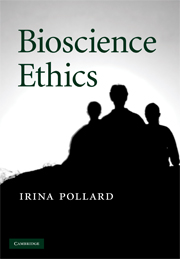Book contents
- Frontmatter
- Contents
- Preface
- Acknowledgements
- 1 Human origins, natural selection and the evolution of ethics
- 2 Sex determination, brain sex and sexual behaviour
- 3 Inappropriate lifestyle and congenital disability in children: basic principles of growth, toxicology, teratogenesis and mutagenesis
- 4 Substance abuse and parenthood: biological mechanisms – bioethical responsibilities
- 5 Fertility awareness: the ovulatory method of birth control, ageing gametes and congenital malformation in children
- 6 Understanding child abuse and its biological consequences
- 7 The state of wellbeing: basic principles, coping strategies and individual mastery
- 8 The state of wellbeing: on the end-of-life care and euthanasia
- 9 Current reproductive technologies: achievements and desired goals
- 10 The recombinant DNA technologies
- 11 Stem cells, nuclear transfer and cloning technology
- 12 Human-dominated ecosystems: re-evaluating environmental priorities
- 13 Human-dominated ecosystems: reclaiming the future for following generations
- 14 Human-dominated ecosystems: warfare = fitness enhancement or losing strategy?
- 15 Human-dominated ecosystems: reworking bioethical frontiers
- Further reading
- Index
14 - Human-dominated ecosystems: warfare = fitness enhancement or losing strategy?
Published online by Cambridge University Press: 17 February 2010
- Frontmatter
- Contents
- Preface
- Acknowledgements
- 1 Human origins, natural selection and the evolution of ethics
- 2 Sex determination, brain sex and sexual behaviour
- 3 Inappropriate lifestyle and congenital disability in children: basic principles of growth, toxicology, teratogenesis and mutagenesis
- 4 Substance abuse and parenthood: biological mechanisms – bioethical responsibilities
- 5 Fertility awareness: the ovulatory method of birth control, ageing gametes and congenital malformation in children
- 6 Understanding child abuse and its biological consequences
- 7 The state of wellbeing: basic principles, coping strategies and individual mastery
- 8 The state of wellbeing: on the end-of-life care and euthanasia
- 9 Current reproductive technologies: achievements and desired goals
- 10 The recombinant DNA technologies
- 11 Stem cells, nuclear transfer and cloning technology
- 12 Human-dominated ecosystems: re-evaluating environmental priorities
- 13 Human-dominated ecosystems: reclaiming the future for following generations
- 14 Human-dominated ecosystems: warfare = fitness enhancement or losing strategy?
- 15 Human-dominated ecosystems: reworking bioethical frontiers
- Further reading
- Index
Summary
He was … beginning to wonder if discord were not a more powerful principle than harmony. Communal violence everywhere was an intimate crime. When it burst out one was not murdered by strangers. It was your neighbours, the people with whom you had shared the high and low points of life, the people whose children your own children had been playing with just yesterday. These were the people in whom the fire of hatred would suddenly light up, who would hammer on your door in the middle of the night with burning torches in their hands.
On the face of things, institutionalized violence, in particular the deployment of scientific expertise in advancing technologies of destruction, is certainly a losing evolutionary strategy. On the other hand, fundamental differences do exist among scientists’ ethical values relating to territorial defence and ‘justified’ environmental destruction. Nevertheless, without a doubt, many are of the opinion that a mature society can no longer tolerate the hideousness of warfare on the following grounds. Firstly, since modern large-scale conflict can no longer lead to the monopolizing of coveted scarce resources (unlike the situation in our tribal past), the activity is self-destructive and has no biological survival value. Old notions of national security are outmoded, and military spending must be diverted towards sustainable development and the alleviation of disaffecting poverty. Secondly, dysfunctional, non-adaptive human behaviour – not the power of science and technology – is the key factor threatening human survival.
- Type
- Chapter
- Information
- Bioscience Ethics , pp. 243 - 262Publisher: Cambridge University PressPrint publication year: 2009



